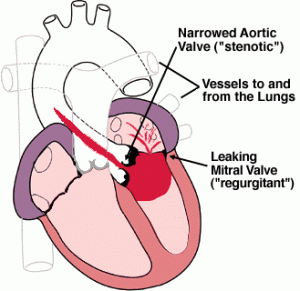What is Valvular Heart Disease
 Valvular Heart Disease defines any disease that involved one or more of your heart valves. Whether it’s your mitral or aortic valves on the left side of your heart or the tricuspid and pulmonary valves on the right side of your heart, damage or defect in any of these valves is considered Valvular Heart Disease.
Valvular Heart Disease defines any disease that involved one or more of your heart valves. Whether it’s your mitral or aortic valves on the left side of your heart or the tricuspid and pulmonary valves on the right side of your heart, damage or defect in any of these valves is considered Valvular Heart Disease.
What You Should Know About Valvular Heart Disease
The tricuspid and mitral valves control your blood flow between the ventricles and atria (upper and lower chambers of your heart). The aortic valve controls blood flow between your heart and the aorta while the pulmonary valve governs the flow of blood from you heart to your lungs. The aortic and mitral valves are the valves that are most frequently damaged or defected by Valvular Heart Disease.
When your valves are functioning normally, your blood flow moves with proper force in the right direction at the right time. When Valvular Heart Disease is present, your valves become too narrow and start to harden which doesn’t allow them to open fully, or become unable to close entirely (incompetent).
When you have a stenotic valve, it forces blood back up into the adjacent heart chamber, while an incompetent valve allows leakage of blood back into the chamber where it previously came out from. To make up for inadequate blood pumping, your heart muscles will enlarge and thicken, making it lose elasticity and efficiency. Additionally, there are cases where blood pooling into the chambers of y our heart may occur which increases the tendency to clot, and in turn, increases the risk of a stroke or pulmonary embolism.
Valvular Heart Disease varies in severity. There are mild cases where there are no symptoms present, and then there are advanced cases where Valvular Heart Disease may cause congestive heart failure in addition to other complications. Treatment for the different levels of VHD will vary depending on the extent of the disease.
Symptoms of Valvular Heart Disease
VHD symptoms may occur suddenly, depending on how quickly the disease is developing. Please consult your doctor if you feel you may be at risk. Valvular Heart Disease symptoms may include:
- Rapid weight gain
- Fever (from bacterial endocarditis)
- Dizziness (aortic stenosis)
- Fainting
- Fatigue
- Palpitations or chest pain (could be mild)
If you are experiencing any of these symptoms, it is crucial that you speak to your doctor immediately to begin testing and start the appropriate treatment.

